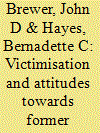| Srl | Item |
| 1 |
ID:
148780


|
|
|
|
|
| Summary/Abstract |
The granting of amnesties has now become a cornerstone of peacebuilding efforts in societies emerging from conflict. Yet, the impact of the role of religion and ethnicity in determining attitudes towards such arrangements has not been empirically assessed. Mindful of this omission, this article investigates the relationship between a range of religious measures — religious practices and beliefs in and about God — and ethnonationalist identity on public attitudes toward amnesty in Northern Ireland. Based on nationally representative survey data, the results suggest that, although Protestants are significantly more opposed to such an initiative than Catholics, both religious beliefs and ethnonational identity are significant, albeit divergent, net predictors with respect to their differing views.
|
|
|
|
|
|
|
|
|
|
|
|
|
|
|
|
| 2 |
ID:
004983


|
|
|
|
|
| Publication |
Houndmills, Macmillan, 1994.
|
| Description |
x,154p.;tables and maps
|
| Standard Number |
9780333605912
|
|
|
|
|
|
|
|
|
|
|
|
Copies: C:1/I:0,R:0,Q:0
Circulation
| Accession# | Call# | Current Location | Status | Policy | Location |
| 036053 | 301.0968/BRE 036053 | Main | On Shelf | General | |
|
|
|
|
| 3 |
ID:
140871


|
|
|
|
|
| Summary/Abstract |
The release of ex-combatants and the mechanisms for their re-integration within society has become an increasingly controversial issue in peace settlements. Yet to date, the view of victims concerning such arrangements in post-conflict societies remains unexplored. Mindful of this omission and using Northern Ireland as a case study, this article investigates the relationship between victimisation and attitudes towards the treatment of former political prisoners. Based on the 2011 Northern Ireland Social and Political Attitudes Survey, the results suggest that individual victims—those who directly and/or indirectly experienced violent incidents—are notably less supportive of a punitive approach towards the treatment of former political prisoners than non-victims. Moreover, this is particularly the case when victims from within the Catholic community are considered. The Northern Ireland evidence suggests that victims can act as a positive and inclusive force in terms of the rehabilitation and re-integration of former combatants in societies emerging from conflict.
|
|
|
|
|
|
|
|
|
|
|
|
|
|
|
|